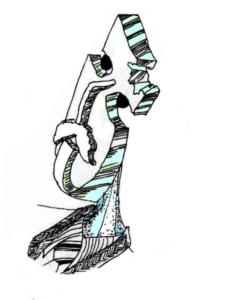
Apollo, Απόλλων (Apollon) has been considered as “the most Greek of all gods.” Apollo’s most common attributes were the bow and arrow. “Bow and arrow” in Türkü is called “ox” (okh). Here, we will see that most of the attributes featuring his characteristics has been originated from this very core word: ox /okh/ (bow & arrow).
|
core characteristic concept: ox /okh/ He is considered as: . god of archery: oxlu . far-shooter: ox atan . reciter: oxuyan . singer: oxuyan . plague infector: oxduran . healer: toxdadan able to turn into or make similar: oxşadan . [for his friends] verbal mourner: oxşama deyən |
diachronic system of ox // ox‘un zaman-ala sistemi
|
discontinuant structure qatmaz quruluş |
continuant structure qatmar quruluş |
| ox (noun) (isim) (bow & arrow) |
ox- (verb) (fel) ([the disease from one] to infect the others) |
base infinitive system/təməl kök sistemi:
. 1. oxmaq ↔ 2. oxumaq
. ↓ ↓
. 3. oxunmaq ↔ 4. oxutmaq
base infinitives/təməl köklər:
1. kök |
2. bare infinitive ending in vowel
2. saitdə bitən kök |
3. bare infinitive (self-transitive)
3. öz-təəddili kök |
4. bare infinitive (other-transitive)
4. özgə-təəddili kök |
| oxmaq | oxumaq | oxunmaq | oxutmaq |
. 1. oxmaq: [the disease] to infect the others/mərizligin birisindən başqasına yetib yoluxdurması
. 2. oxumaq: to read, to sing
. 3. oxunmaq: to make itself be read (It is not passive voice. It is self-transitive)
. to make itself be sung
. 4. oxutmaq: to make some definite written thing be read
. to make some definite song be sung
. qarğı
diachronic system of qarğı//qarğı‘nın zaman-ala sistemi
|
discontinant structure qatmaz quruluş |
continuant structure qatmar quruluş |
| qarğı (noun) (isim)
meaning: arrow |
qarğı- (verb) (fel)
meaning: to curse |
Also in Mongolian: sum (/u/ as in “put”)
. sum: arrow
. sum: temple
Temple and arrow, [which are attributed to Apollo] seem to be from the same origin.
